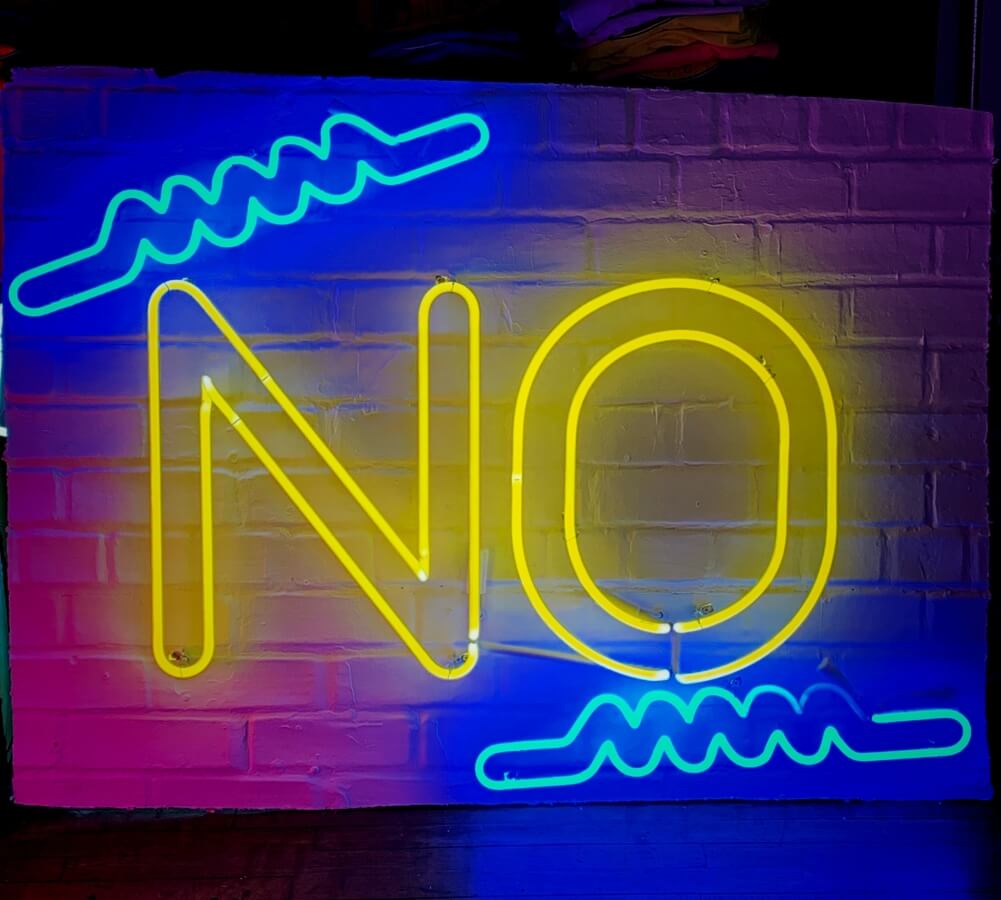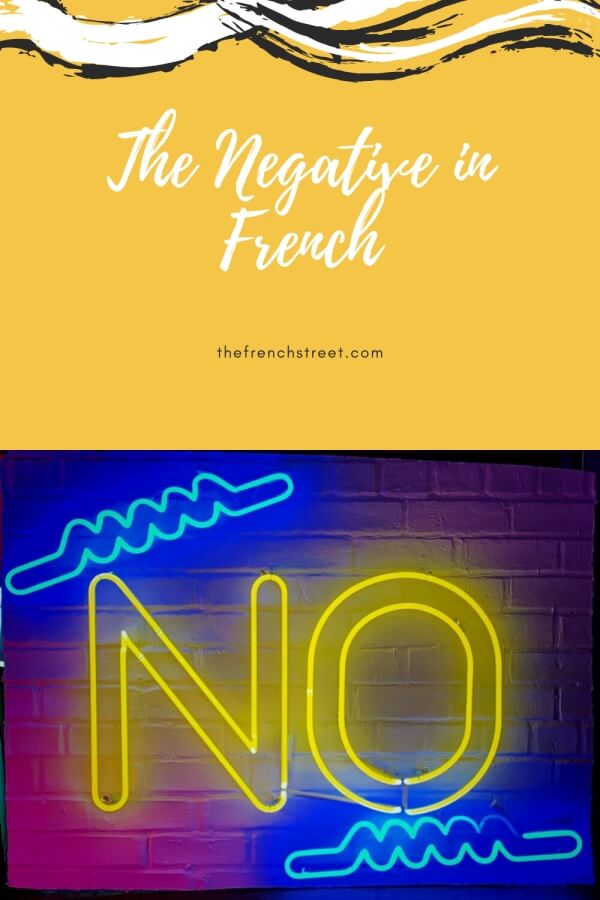How do you feel so far? We’ve already covered the alphabet, numbers, pronunciation, and some verb conjugations. It’s a lot, right? Well, today we will learn how to use the negative in French.
There are several ways to express negation in French, although they differ a little from the English form. The good news is, it’s not that complicated. Well, it can be complicated depending on the tense, but we will not worry about that now. We will start with the negation in the simple present tense.
The French negation follows definite patterns, making it easier to understand. Let’s jump right in, shall we?
Ne + Pas
This is the standard form to express negation in all tenses. While in English, we have to use an auxiliary such as be, do, have, or will + not + a conjugated verb depending on the tense, in French, we use ne + conjugated verb + pas for most negative constructions. French is much simpler in that respect as compared to English. Let’s take a look at some examples:
 Je n‘aime pas le poisson. I don’t like fish.
Je n‘aime pas le poisson. I don’t like fish.
Tu ne vas pas a l’école. You don’t go to school.
Vous n‘êtes pas obligé. You are not obligated.
Il n‘a pas de voiture. He doesn’t have a car.
Elle n‘a pas de sœurs. She doesn’t have any sisters. (We usually use de in negation even when preceding a plural noun. More of that later.).
In practice, though, many French natives drop ne and just use pas. Instead of saying, “Je n’aime pas le poisson“, they would say, “J’aime pas le poisson.” However, it’s always good to know the standard rules, especially if you’re taking a test. Other than that, you’re fine by just using pas.
Some common adverbs used with pas are:
- pas du tout (not at all)
- pas encore (not yet)
- pas non plus (neither, not either)
- pas toujours (not always)
The structure doesn’t change. It’s always ne + conjugated verb + pas (adverb).
Ne + Point
This structure works exactly like ne + pas. Actually, it’s an old-fashioned form to express negation. It’s fallen out of use for the most part and is mostly used in written form only. It is considered too formal. Let’s see some examples:
Je ne sais point = Je ne sais pas (I don’t know).
Elle ne veut point y aller = Elle ne veut pas y aller (She doesn’t want to go).
Ne + Jamais
When you want to express that something never happens, we use ne + jamais. In this case, we don’t use pas but jamais. Look at the following examples:
Je ne suis jamais en retard. I’m never late.
Il ne mange jamais de viande. He never eats meat.
Elles ne sortent jamais après minuit. They never go out after midnight.
Ne + Plus
When you want to express that something doesn’t happen anymore, you have to use plus. Look at the examples below:
Tu ne m’aime plus. You don’t love me anymore.
Vous n‘allez plus a l’église. You don’t go to church anymore.
Ils ne sont plus des enfants. They’re not kids anymore.
Ne + Guère
We use this construction to express that something hardly happens. Look at the following examples:
Je n‘ai guère le temps. I hardly have time.
Nous n‘avons guère le choix. We hardly have any choice.
Il ne boit guère de café. He hardly drinks any coffee.
Ne + Que

There is a special case where we don’t use pas, jamais, plus or another adverb to express negation. Instead, when we want to express a restriction, we use ne + que. It translates as “only” in English. Look at the examples below:
Je n‘ai que cinq dollars. I only have five dollars.
On n‘est que des amis. We’re only friends.
Elle ne regarde que des films américains. She only watches American movies.
Ne + Ni
When we want to express a negative idea that involves two or more things, we use ne + ni. Look at the following examples:
Je ne bois ni café ni thé. I don’t drink coffee or tea.
Tu ne veux ni chanter ni danser. You don’t want to sing or dance.
Ils n‘ont pas ni chats ni chiens. They don’t have any cats or dogs.
Partitive Articles
In French we always use articles. Some of the most commonly used are partitive articles. We use them to talk about a part of a larger something. There is no exact equivalent in English, but they’re similar to some or any in English.
The four partitive articles are du, de la, de l’, and des. Many students make the same mistake when expressing negation with partitive articles. Look at the examples below:
Je bois du jus –> Je ne bois pas de jus (I drink juice –> I don’t drink juice).
Je mange des pommes de terre –> Je ne mange de pommes de terre (I eat potatoes –> I don’t eat potatoes).
In negative sentences, we use de regardless of the gender and number of the noun they precede. However, there is an exception. We don’t use de with sentences that use être or other state-of-being verbs. Look at the following example:
C’est du café colombien? Is this Colombian coffee?
Non, ce n’est pas du café colombien. No, it’s not Colombian coffee.
In this case, we don’t use de. We use du instead because coffee is a masculine singular noun. With être and state-of-being verbs, we have to consider gender and number to decide which article to choose.
Negative Pronouns
Just like English has negative indefinite pronouns such as no one, nobody, nothing, and nowhere, French also has its equivalent forms. Some of the most common indefinite pronouns used in negation are:
- aucun(e) (any, none)
- nulle part (nowhere)
- personne (no one)
- rien (nothing)
However, there is a big difference when expressing negation with negative pronouns. Negative pronouns can go before or after ne, depending on their function as subjects or direct objects. When using pas, jamais, or plus, they always follow ne. Look at the following examples:
Je ne connais personne ici. I don’t know anyone here.
Personne n‘est au bureau. No one is at the office.
Elle ne veut rien. She doesn’t want anything.
Rien n‘est sur la table. Nothing is on the table.
On ne va nulle part le dimanche. We don’t go anywhere on Sundays. (Nulle part is probably an exception. I can’t remember any example where it precedes ne).
Aucune fille n‘est plus intelligente que Chloe. No one is smarter than Chloe.
Watch the video below to review what we just learned. The video is in French, but you can activate English subtitles. It’s a good time to start getting used to listening to spoken French.
Conclusion
There are several ways to express negation in French. The most common one is ne + pas. Other common constructions are:
- ne + point
- ne + jamais
- ne + plus
- ne + guère
- ne + ni
- ne + que
We can also use negative pronouns. In either case, it’s essential to understand the context in which they’re being used. We will always use ne, but the complement will vary depending on the concept.
Some expressions have fallen out of use, but it’s always good to know them. You might not use them when speaking French, but you will probably run into them when reading books or newspapers.
I hope you found this useful. If you have any questions or comments, please feel free to leave them below. Au revoir, les amis!



Learning French is a very nice decision to make but trust me, it requires a lot of time and dedication though it’s fine but your mind needs to be in it. The words compounding to make a negation is quite cool and it can be simple if one studies it as you’ve spelled it here. This is very resourceful information for me.
Absolutely! Learning French takes time and dedication, but if you’re serious about it, you will eventually succeed.
Feel free to check out my other posts for more tips. Thanks for commenting.
French is very different from my mother tongue and that has made learning it very hard, but I’ve stuck to it as I really want to learn it. it is personally very attractive to me (not called the language of love for nothing! ) the ne and pas have been even more confusing as we don’t have anything similar to it in my mother tongue. This makes them a very foreign and unknown thing and it is confusing like I know what it is but I am not used to it? But I think I will get used to it eventually as time passes, so no worries 🙂
Thanks for the classes. They are really awesome and straightforward!
Hey, Abdul,
Yeah, I feel ya. There’s nothing similar in my native tongue either, so it can be confusing. It is especially more confusing when using other structures, but let’s not worry about that just now.
I’m glad you’ve found this useful. Thanks for commenting.